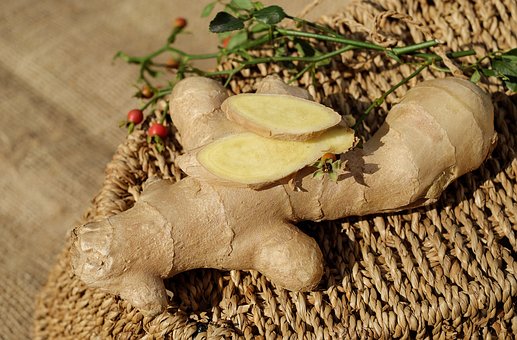Copy Link
Email
Print

Ginger is an herb. The rhizome (underground stem) is used as a spice and also as a medicine. It can be used fresh, dried and powdered, or as a juice or oil. Ginger is commonly used to treat various types of "stomach problems," including motion sickness, morning sickness, colic, upset stomach, gas, diarrhea, nausea and vomiting after surgery, as well as loss of appetite. Other uses include treating upper respiratory tract infections, cough, and bronchitis.
Podlogar JA, Verspohl EJ. Antiinflammatory effects of ginger and some of its components in human bronchial epithelial (BEAS-2B) cells. 1. Phytother Res. 2012 Mar;26(3):333-6. doi: 10.1002/ptr.3558. Epub 2011 Jun 23. The proinflammatory chemokine interleukin-8 is increased in asthmatic patients. Traditionally, ginger is used as an antiinflammatory drug. An extract and several compounds of Zingiber officinale (ginger) were tested in human bronchial epithelial cells (BEAS-2B cells) with respect to their effect on lipopolysaccharide (LPS)-induced secretion of the proinflammatory chemokine interleukin?8 (IL-8) and RANTES (regulated upon activation, normal T-cell expressed and secreted). An oily extract of ginger rhizome with?>?25% total pungent compounds, ginger volatile oil, ar-curcumene and ?-pinene reduced the LPS-induced IL-8 secretion (measured by a specific enzyme-linked immunosorbent assay), whereas a spissum extract, the pungents [6]-gingerol and its metabolite [6]-shogaol, and the terpenoids citral and ?-phellandrene showed no effect. The LPS-induced slight increase of RANTES was reduced by volatile oil, ar-curcumene and ?-pinene. There was no effect of LPS on TNF-?. Our results suggest that distinct ginger compounds could be used as antiinflammatory drugs in respiratory infections.
The proinflammatory chemokine interleukin-8 is increased in asthmatic patients. Traditionally, ginger is used as an antiinflammatory drug. An extract and several compounds of Zingiber officinale (ginger) were tested in human bronchial epithelial cells (BEAS-2B cells) with respect to their effect on lipopolysaccharide (LPS)-induced secretion of the proinflammatory chemokine interleukin?8 (IL-8) and RANTES (regulated upon activation, normal T-cell expressed and secreted). An oily extract of ginger rhizome with?>?25% total pungent compounds, ginger volatile oil, ar-curcumene and ?-pinene reduced the LPS-induced IL-8 secretion (measured by a specific enzyme-linked immunosorbent assay), whereas a spissum extract, the pungents [6]-gingerol and its metabolite [6]-shogaol, and the terpenoids citral and ?-phellandrene showed no effect. The LPS-induced slight increase of RANTES was reduced by volatile oil, ar-curcumene and ?-pinene. There was no effect of LPS on TNF-?. Our results suggest that distinct ginger compounds could be used as antiinflammatory drugs in respiratory infections.
Podlogar JA, Verspohl EJ. Antiinflammatory effects of ginger and some of its components in human bronchial epithelial (BEAS-2B) cells. 1. Phytother Res. 2012 Mar;26(3):333-6. doi: 10.1002/ptr.3558. Epub 2011 Jun 23.
 The proinflammatory chemokine interleukin-8 is increased in asthmatic patients. Traditionally, ginger is used as an antiinflammatory drug. An extract and several compounds of Zingiber officinale (ginger) were tested in human bronchial epithelial cells (BEAS-2B cells) with respect to their effect on lipopolysaccharide (LPS)-induced secretion of the proinflammatory chemokine interleukin?8 (IL-8) and RANTES (regulated upon activation, normal T-cell expressed and secreted). An oily extract of ginger rhizome with?>?25% total pungent compounds, ginger volatile oil, ar-curcumene and ?-pinene reduced the LPS-induced IL-8 secretion (measured by a specific enzyme-linked immunosorbent assay), whereas a spissum extract, the pungents [6]-gingerol and its metabolite [6]-shogaol, and the terpenoids citral and ?-phellandrene showed no effect. The LPS-induced slight increase of RANTES was reduced by volatile oil, ar-curcumene and ?-pinene. There was no effect of LPS on TNF-?. Our results suggest that distinct ginger compounds could be used as antiinflammatory drugs in respiratory infections.
The proinflammatory chemokine interleukin-8 is increased in asthmatic patients. Traditionally, ginger is used as an antiinflammatory drug. An extract and several compounds of Zingiber officinale (ginger) were tested in human bronchial epithelial cells (BEAS-2B cells) with respect to their effect on lipopolysaccharide (LPS)-induced secretion of the proinflammatory chemokine interleukin?8 (IL-8) and RANTES (regulated upon activation, normal T-cell expressed and secreted). An oily extract of ginger rhizome with?>?25% total pungent compounds, ginger volatile oil, ar-curcumene and ?-pinene reduced the LPS-induced IL-8 secretion (measured by a specific enzyme-linked immunosorbent assay), whereas a spissum extract, the pungents [6]-gingerol and its metabolite [6]-shogaol, and the terpenoids citral and ?-phellandrene showed no effect. The LPS-induced slight increase of RANTES was reduced by volatile oil, ar-curcumene and ?-pinene. There was no effect of LPS on TNF-?. Our results suggest that distinct ginger compounds could be used as antiinflammatory drugs in respiratory infections.
Link to this article: Show: HTML Link • Full Link • Short Link
Share or Bookmark this page: You will need to have an account with the selected service in order to post links or bookmark this page.





|
Related Articles:
- Synbiotic (Probiotic and Ginger Extract) Loaded Floating Beads: A Novel Therapeutic Option in an Experimental Paradigm of Gastric Ulcer
- 4-Shogaol, an Active Constituent of Dietary Ginger, Inhibits Metastasis of MDA-MB-231 Human Breast Adenocarcinoma Cells by Decreasing the Repression of NF-?B/Snail on RKIP
- Inhibition of LPS Binding to MD-2 Co-Receptor for Suppressing TLR4-Mediated Expression of Inflammatory Cytokine by 1-Dehydro-10-Gingerdione From Dietary Ginger
- Zerumbone, a Southeast Asian Ginger Sesquiterpene, Induced Apoptosis of Pancreatic Carcinoma Cells Through P53 Signaling Pathway
- Variation in Concentration and Labeling of Ginger Root Dietary Supplements
- Ginger Root Associated with Preventing Colon Cancer, Study
- Ginger: An Excellent Natural Remedy
- Ginger Beneficial for Relieving Pregnancy-Related Nausea
- Ibn al-Qayyim: Ginger is Beneficial for Digestion, Eyesight and Nausea Among Other Benefits
- Spices for Health
You must be registered and logged in to comment.
Most Popular
Latest Articles
Popular Subjects
Health, fitness and longevity
Based upon the principles of health
in the Qur'an and Prophetic Traditions.
HealthyMuslim.Com
There are two bounties in which
most people lose out: good health
and free time. Al-Bukhari.
The information on this site is provided for educational purposes only. It is not intended as a substitute for professional advice of any kind.























